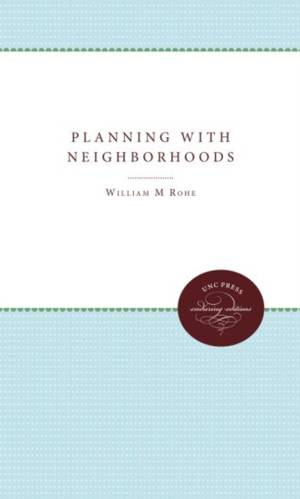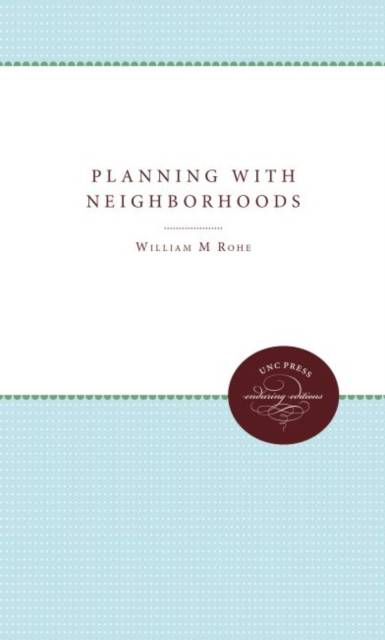
- Afhalen na 1 uur in een winkel met voorraad
- Gratis thuislevering in België vanaf € 30
- Ruim aanbod met 7 miljoen producten
- Afhalen na 1 uur in een winkel met voorraad
- Gratis thuislevering in België vanaf € 30
- Ruim aanbod met 7 miljoen producten
Zoeken
Omschrijving
Neighborhood planning programs involve citizens in developing plans and self-help projects for their neighborhoods through local organizations. They also assist residents in reviewing projects developed by city agencies. Based on a survey of fifty-one neighborhood planning programs and in-depth case studies of Atlanta, Cincinnati, Houston, St. Paul, Wilmington, N.C., and Raleigh, Planning with Neighborhoods offers the first comprehensive description and evaluation of the effectiveness of these programs.
Moving beyond theory, this study reviews the actual accomplishments and limitations of neighborhood planning programs and offers specific recommendations for designing a successful program. Included are a thorough history of neighborhood planning programs and an examination of the social, political, and planning theories that support their existence. Eight propositions on the benefits of a neighborood-based approach to planning are derived from this theory and evaluated on the basis of actual experience with this type of program. Speaking to both academics interested in neighborhood issues and planning practitioners, Planning with Neighborhoods concludes with recommendations for establishing effective neighborhood planning programs and improving existing programs.
Originally published in 1985.
A UNC Press Enduring Edition -- UNC Press Enduring Editions use the latest in digital technology to make available again books from our distinguished backlist that were previously out of print. These editions are published unaltered from the original, and are presented in affordable paperback formats, bringing readers both historical and cultural value.
Moving beyond theory, this study reviews the actual accomplishments and limitations of neighborhood planning programs and offers specific recommendations for designing a successful program. Included are a thorough history of neighborhood planning programs and an examination of the social, political, and planning theories that support their existence. Eight propositions on the benefits of a neighborood-based approach to planning are derived from this theory and evaluated on the basis of actual experience with this type of program. Speaking to both academics interested in neighborhood issues and planning practitioners, Planning with Neighborhoods concludes with recommendations for establishing effective neighborhood planning programs and improving existing programs.
Originally published in 1985.
A UNC Press Enduring Edition -- UNC Press Enduring Editions use the latest in digital technology to make available again books from our distinguished backlist that were previously out of print. These editions are published unaltered from the original, and are presented in affordable paperback formats, bringing readers both historical and cultural value.
Specificaties
Betrokkenen
- Auteur(s):
- Uitgeverij:
Inhoud
- Aantal bladzijden:
- 265
- Taal:
- Engels
- Reeks:
Eigenschappen
- Productcode (EAN):
- 9780807841334
- Verschijningsdatum:
- 31/05/1985
- Uitvoering:
- Paperback
- Formaat:
- Trade paperback (VS)
- Afmetingen:
- 143 mm x 229 mm
- Gewicht:
- 390 g

Alleen bij Standaard Boekhandel
+ 152 punten op je klantenkaart van Standaard Boekhandel
Beoordelingen
We publiceren alleen reviews die voldoen aan de voorwaarden voor reviews. Bekijk onze voorwaarden voor reviews.











